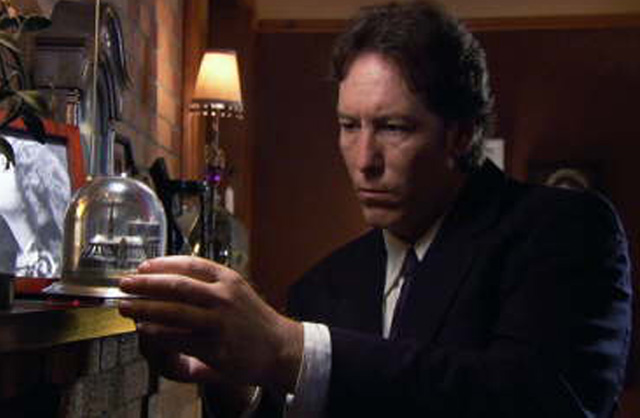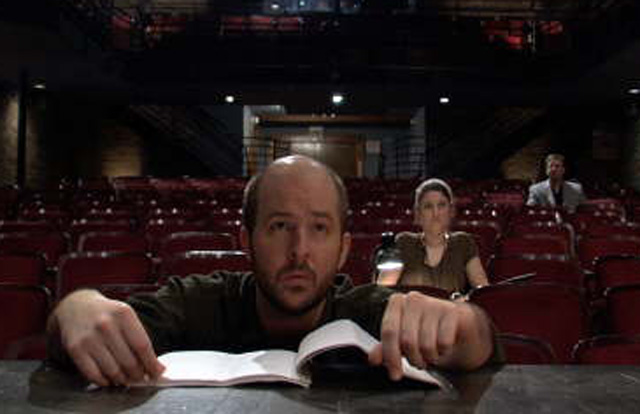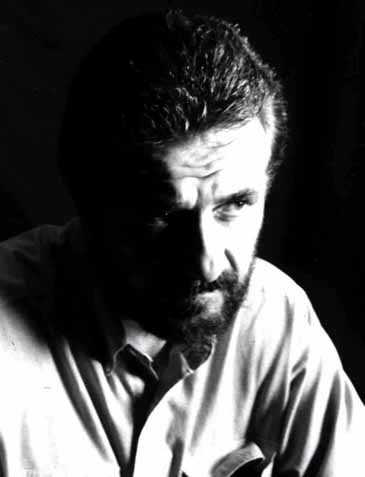CHICAGO – The Steppenwolf Theatre of Chicago continues to provide different viewpoints on the American stage, and their latest “Little Bear Ridge Road” is no exception. Featuring ensemble member Laurie Metcalf, it’s the resonate story of a family at the crossroads. For tickets/details, click LITTLE BEAR.
Interview: Director I. Michael Toth Conjures Up ‘The Dream Play’
CHICAGO – “The Dream Play” is a new, significant film work from first-time feature director I. Michael Toth. It is part of the film project called “Gray in White and Black,” with a separate but connected film called “The Choice.” The Dream Play will have its Chicago premiere at the Midwest Independent Film Festival on May 3rd.
The Gray in White and Black project was born from a short that Toth made in 2005, called “Cast in Gray.” He expanded that project into the two films, creating them as his feature debut. Both are meditations on the illusion of life, with The Dream Play taking it even further by highlighting a troupe of actors as they attempt to stage August Strindberg’s “The Dream Play.”
 Photo credit: Life is a Dream Productions |
On the cusp of I. Michael Toth’s Chicago premiere of The Dream Play, the director did a phone interview with HollywoodChicago.com.
HollywoodChicago: What is the origin of the film ‘The Dream Play’, both as a pairing with ‘The Choice’ and as a separate narrative statement?
I. Michael Toth: The project started about seven years ago. I did a short film called ‘Cast in Gray,’ it wasn’t so short, it was 39 minutes long. The origin of that film was like a strange dream that I put together. I put it in the festivals in 2004 and 2005, and it won some awards.
From that point on, the idea was to make a feature film, but financing was difficult. I wrote several different scripts that were too expensive to produce, so we decided to start with the short film. It was designed to go into two different directions, with two different interpretations at the end. So the idea was to create two different scenarios and two different outcomes for the decisions the character makes in the films. The whole ‘gray’ part came from the short Cast in Gray, and from that point on ‘The Dream Play’ and ‘The Choice’ incorporated that gray part, and in essence that was the starting point for both films.
HollywoodChicago: The Dream Play deals with second acts, choices and the mystery of these choices. How do the mechanics of the stage troupe, the play within the film and theater itself interact with those themes?
Toth: The main theme of both films is identity, which I am obsessed with because I’m an immigrant. I came from a country that doesn’t exist anymore called Yugoslavia. When you’re an immigrant in this country, or any country, you have a problem with changing identity because you’re not the same as you used to be before.
There is also something I call ‘metaphysical cinema,’ which is where I’m inclined to go towards. I’m interested in the themes and ideas that concern everybody. So there are very interesting points when you’re talking about theater and actors. Their identity is in question whenever they play roles, so that is a great connection to the main theme of the film.
The other thing that interests me is the nature of the creative process. It is a god-like feeling when you create, especially for artists. That is explored in both films, but in The Dream Play it is much more because there is the writer who writes the play and then the actors who perform it. The writer or director has a god-like feeling in a sense. That is something that has always interested me.
Also, messing with somebody’s life is another way to play God. Which is the point of The Choice. Getting involved with someone else and pushing his decision one way or another is playing God.
HollywoodChicago: So ‘The Dream Play’ precedes the events in ‘The Choice’?
Toth: The Dream Play is the fork in the road film. In this the main character decides to live, to exchange identities with the hitchhiker. The idea in both films is that you have at least two different interpretations of it, so nothing is set in stone. You could interpret the first film, The Dream Play, it could be just an existential possibility in the main character that he had this epiphany before he died and it’s just the possibility in a dream. It also can be straight forward; he chose to live and now there is a new life. In The Choice, he makes a different choice, and now he dies. You can called that a film about death or a film about life, the life of the characters who survive him.
 Photo credit: Life is a Dream Productions |
HollywoodChicago: What intrigues you about how human beings communicate, in relationship to the interactions in The Choice and The Dream Play?
Toth: In a sense, nothing is really direct, everything is implied. The subtext exists in both scripts that is very heavily laid down. Within the symbolism there is a communication. The simple dialogue between the characters is a game, communication is a game. Sometimes it is purposely designed, sometimes it just happens that way. But in playing the truth and lie game, that is essential for their communication in both films.
HollywoodChicago: There is a different and peculiar rhythm to the lives portrayed in The Choice and The Dream Play. What are the characteristics of your ideal character personality, as in what would someone expect when meeting a typical character in one of your films?
Toth: Well, you can say that there is mystery in human beings in any personality. Nobody has a pure, explicit personality where I can say I know this person, or I know what this person thinks of me or anybody else. There is nothing that we can really know.
I don’t really know what you think of me or in a sense what your questions mean. You have other ideas behind them rather than a straightforward question. Not even my wife, I don’t know what she thinks of me, though she claims that she loves me, I’m not sure. You can never be sure of anything, and that is the essence of any character that appears. People really try to figure out someone else, but you can’t because it’s impossible to become somebody else, which leads back to the question of identity again. What is identity? Do we understand the identity of other people? Can we really perceive that as something knowable?
 Photo credit: Life is a Dream Productions |
HollywoodChicago: Since your mother is Serbian and your father is Hungarian, and you grew up in Communist Yugoslavia, what stayed with you from your early years that you want to communicate in your films, that is especially different from culture in the United States?
Toth: Inevitably I have a different perspective coming from a different world. First of all, there was the image of the great United States of America, and the whole notion of coming to the ‘Land of the Free and the Brave.’ That changes when you come and actually start living here. Gaining that perspective, and getting the different education, social and communication skills here, it is of great benefit for anybody who makes art or film in this country. My perspective is different because I know a little bit more than anyone who has just lived here.
It was also a disadvantage because I came here later, not as a kid, and I do have an accent. Learning how to think, write, read and dream in English was a long process, it took me seven years to really start writing English scripts. That is sometimes good and sometimes bad, because I lost so many years just trying to communicate my ideas in a different language.
HollywoodChicago: As a director, which of your director influences did you pay homage to in your films?
Toth: There are several of them. I think the closest to the ideas and themes I’m dealing with is Krzysztof Kieslowski [”Double Life of Veronique”], that metaphysical cinema we were talking about, trying to express something that is inexpressible. There were homages to him everywhere. I couldn’t resist the part in The Dream Play where they are drinking coffee, the character dips the sugar cube in the coffee cup and the cube becomes dark and absorbs the coffee into the white cube.
 | By PATRICK McDONALD |


